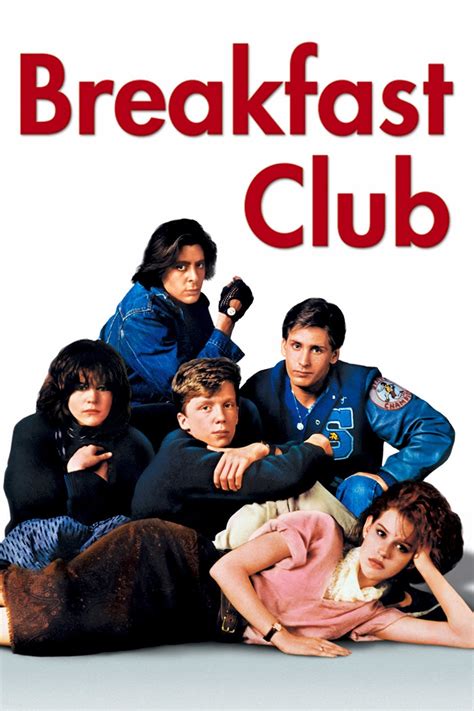The Breakfast Club
directed by: John Hughes, year: 1985
actors: Emilio Estevez, Molly Ringwald, Judd Nelson, Ally Sheedy, Anthony Michael Hall
actors: Emilio Estevez, Molly Ringwald, Judd Nelson, Ally Sheedy, Anthony Michael Hall

Description:
The Breakfast Club, released in 1985, is a coming-of-age film that explores the dynamics of high school social groups and stereotypes. Set in a single day of Saturday detention, the story follows five diverse students who initially see each other as nothing more than their respective cliques: a brain, an athlete, a basket case, a princess, and a criminal. As the day unfolds, they open up to each other, revealing their insecurities and shared struggles, ultimately forming unexpected friendships.Keywords:
Teenage Angst, Identity, Social Cliques, Rebellion, Self Discovery, Teenage Responsibility, Teen Angst, School, Teen CultureWhy is The Breakfast Club so iconic?
"The Breakfast Club" is iconic for its groundbreaking portrayal of teenage life and high school stereotypes in the 1980s. Directed by John Hughes, the film brings together five diverse characters—each representing different social cliques—who bond during Saturday detention. Its exploration of identity, peer pressure, and the struggles of adolescence resonates across generations. The memorable dialogue, poignant themes, and the famous "We're all pretty bizarre" line emphasize shared human experiences, making it a timeless classic in teen cinema.
What was the famous line from The Breakfast Club?
One of the most famous lines from "The Breakfast Club" is the closing monologue by John Bender, played by Judd Nelson. He states, "And you know what? You’re not going to be able to tell me that I don’t have a right to be angry. I’m not going to let you tell me that I’m wrong, because you’re the one who’s wrong." This encapsulates the film's themes of identity, societal expectations, and the struggles of adolescence. The movie itself is a classic coming-of-age story that explores the complexities of high school life and the connections formed between different social groups.
Why is The Breakfast Club rated R?
"The Breakfast Club" is rated R primarily for its use of strong language, including frequent profanity, and references to topics such as drug use and sexuality. The film features characters dealing with typical teenage issues, which are often expressed through candid and sometimes crude dialogue. The rating reflects the mature themes and language that may not be suitable for younger audiences, aligning with the film's exploration of identity, social roles, and the complexities of adolescence.
Does Allison have autism in The Breakfast Club?
In "The Breakfast Club," Allison Reynolds, portrayed by Ally Sheedy, does not have an explicit diagnosis of autism. Her character is depicted as a shy, eccentric outsider who struggles with social interaction and expresses herself through unconventional behavior. While some traits may resonate with autism spectrum characteristics, the film does not provide a definitive label. Instead, Allison's character serves to explore themes of identity, acceptance, and the complexities of teenage life.
Explore More Categories: